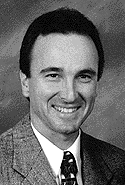 |
Bulletin Board
Volume 12, Number 6
November/December 1997 |
Next in the Town Meeting Series...
|
The latest of NIDA's Town Meeting series will be held April 2 at the Marriott Copley Place in Boston. The meetings are held around the country to dispel myths about drug abuse and addiction and to share with community leaders and the public what has been learned from NIDA-sponsored research.
Speakers and topics on the agenda include:
- NIDA Director Dr. Alan I. Leshner on the current understanding of drug addiction;
- Dr. Kathleen Carroll of Yale University in New Haven, Connecticut, on cognitive behavioral therapy for drug abuse;
- Dr. Richard Catalano of the Seattle Development Research Group on risk and protective factors for drug abuse;
- Dr. Dennis McCarty of Brandeis University in Waltham, Massachusetts, on substance abuse and managed care issues; and
- Dr. Scott Lukas of McLean Hospital in Belmont, Massachusetts, on drugs and the brain.
For the full meeting announcement, see "Understanding Drug Abuse and Addiction: Myths vs. Reality".
Cosponsors for the meeting include Join Together, a project of Boston University to provide resources for communities fighting substance abuse and gun violence; the Massachusetts Department of Public Health; the Massachusetts Governor's Alliance Against Drugs; the Boston Mayor's Office; Brandeis University; McLean Hospital; Boston College School of Social Work; and Harvard Medical School.
For more information about the Boston Town Meeting, call Tracy Eng at (703) 764-0191.
|
Understanding Addiction as a Brain Disease
|
Scientific research over the past 20 years has dramatically enhanced our knowledge of drug abuse and addiction. We now understand that addiction is a disease of the brain that also is closely tied to behavior and cues one receives from the social environment, writes NIDA Director Dr. Alan I. Leshner in an article in the October 3 issue of Science. Treating addiction then means treating the brain disease as well as addressing its behavioral and social aspects, which is the way one treats other brain diseases, such as stroke, schizophrenia, and Alzheimer's disease, Dr. Leshner explains in "Addiction Is a Brain Disease, and It Matters." This article appears with five other science and policy papers in the issue's special section on "The Neuroscience of Drug Abuse." Section topics include insights on drug-exposed fetal brain development, science-based treatment advances, and differences in international drug policies. Science is the weekly magazine of the American Association for the Advancement of Science.
|

|
New Branch Chief In NIDA's Medications Development Division (MDD)

Dr. David J. McCann
|
Dr. David J. McCann has been named chief of NIDA's Pharmacology and Toxicology Branch, which oversees preclinical medications research and development. Part of the Medications Development Division (MDD), the Branch focuses on discovering and developing medications to treat cocaine dependence and on finding medications that will improve the treatment of heroin dependence.
Dr. McCann, a pharmacologist, joined NIDA in 1988 as a staff fellow in its Division of Intramural Research at the Addiction Research Center in Baltimore. While at the ARC, he conducted research on sigma receptors, molecules that interact with PCP (phencyclidine), cocaine, and other drugs. In recognition of his research, Dr. McCann received the NIDA Staff Fellow Award for the most outstanding publication of 1991.
Since 1992, Dr. McCann has overseen a number of medications development projects for MDD. He also led a team of MDD scientists who developed the Division's Opioid Treatment Discovery Program, which is responsible for discovering improved medications for treating opiate dependence.
|
|
NIDA NOTES - November/December 1997 |
[NIDA Home Page][NIDA NOTES Index][1997 Archive Index][Index of this Issue]
|
|